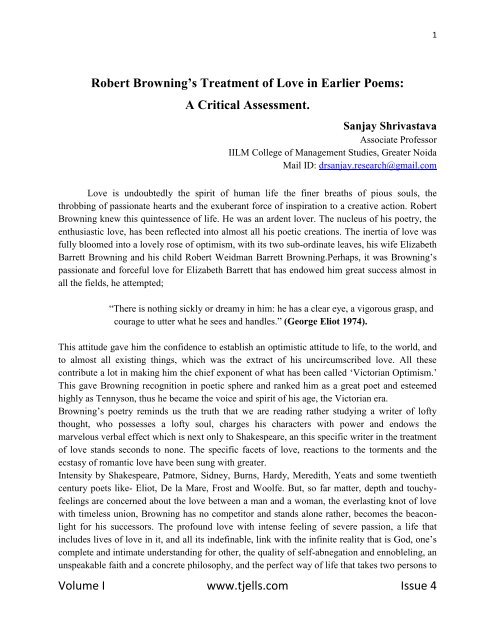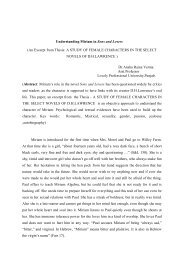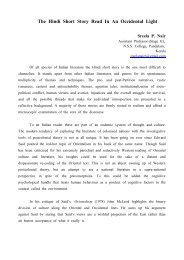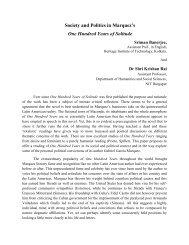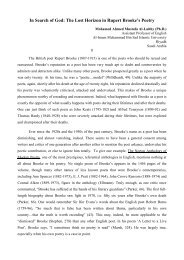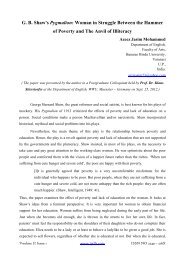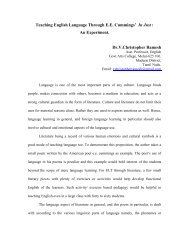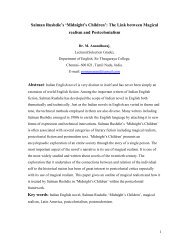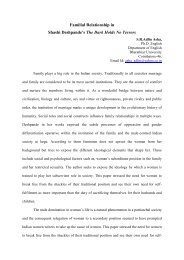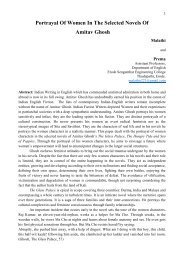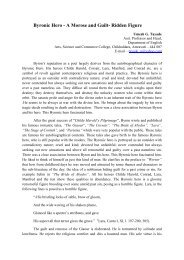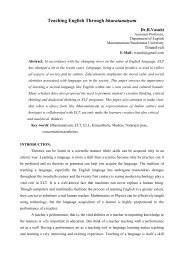Robert Browning's Treatment of Love in Earlier Poems - Tjells
Robert Browning's Treatment of Love in Earlier Poems - Tjells
Robert Browning's Treatment of Love in Earlier Poems - Tjells
Create successful ePaper yourself
Turn your PDF publications into a flip-book with our unique Google optimized e-Paper software.
1<br />
<strong>Robert</strong> Brown<strong>in</strong>g’s <strong>Treatment</strong> <strong>of</strong> <strong>Love</strong> <strong>in</strong> <strong>Earlier</strong> <strong>Poems</strong>:<br />
A Critical Assessment.<br />
Sanjay Shrivastava<br />
Associate Pr<strong>of</strong>essor<br />
IILM College <strong>of</strong> Management Studies, Greater Noida<br />
Mail ID: drsanjay.research@gmail.com<br />
<strong>Love</strong> is undoubtedly the spirit <strong>of</strong> human life the f<strong>in</strong>er breaths <strong>of</strong> pious souls, the<br />
throbb<strong>in</strong>g <strong>of</strong> passionate hearts and the exuberant force <strong>of</strong> <strong>in</strong>spiration to a creative action. <strong>Robert</strong><br />
Brown<strong>in</strong>g knew this qu<strong>in</strong>tessence <strong>of</strong> life. He was an ardent lover. The nucleus <strong>of</strong> his poetry, the<br />
enthusiastic love, has been reflected <strong>in</strong>to almost all his poetic creations. The <strong>in</strong>ertia <strong>of</strong> love was<br />
fully bloomed <strong>in</strong>to a lovely rose <strong>of</strong> optimism, with its two sub-ord<strong>in</strong>ate leaves, his wife Elizabeth<br />
Barrett Brown<strong>in</strong>g and his child <strong>Robert</strong> Weidman Barrett Brown<strong>in</strong>g.Perhaps, it was Brown<strong>in</strong>g’s<br />
passionate and forceful love for Elizabeth Barrett that has endowed him great success almost <strong>in</strong><br />
all the fields, he attempted;<br />
“There is noth<strong>in</strong>g sickly or dreamy <strong>in</strong> him: he has a clear eye, a vigorous grasp, and<br />
courage to utter what he sees and handles.” (George Eliot 1974).<br />
This attitude gave him the confidence to establish an optimistic attitude to life, to the world, and<br />
to almost all exist<strong>in</strong>g th<strong>in</strong>gs, which was the extract <strong>of</strong> his uncircumscribed love. All these<br />
contribute a lot <strong>in</strong> mak<strong>in</strong>g him the chief exponent <strong>of</strong> what has been called ‘Victorian Optimism.’<br />
This gave Brown<strong>in</strong>g recognition <strong>in</strong> poetic sphere and ranked him as a great poet and esteemed<br />
highly as Tennyson, thus he became the voice and spirit <strong>of</strong> his age, the Victorian era.<br />
Brown<strong>in</strong>g’s poetry rem<strong>in</strong>ds us the truth that we are read<strong>in</strong>g rather study<strong>in</strong>g a writer <strong>of</strong> l<strong>of</strong>ty<br />
thought, who possesses a l<strong>of</strong>ty soul, charges his characters with power and endows the<br />
marvelous verbal effect which is next only to Shakespeare, an this specific writer <strong>in</strong> the treatment<br />
<strong>of</strong> love stands seconds to none. The specific facets <strong>of</strong> love, reactions to the torments and the<br />
ecstasy <strong>of</strong> romantic love have been sung with greater.<br />
Intensity by Shakespeare, Patmore, Sidney, Burns, Hardy, Meredith, Yeats and some twentieth<br />
century poets like- Eliot, De la Mare, Frost and Woolfe. But, so far matter, depth and touchyfeel<strong>in</strong>gs<br />
are concerned about the love between a man and a woman, the everlast<strong>in</strong>g knot <strong>of</strong> love<br />
with timeless union, Brown<strong>in</strong>g has no competitor and stands alone rather, becomes the beaconlight<br />
for his successors. The pr<strong>of</strong>ound love with <strong>in</strong>tense feel<strong>in</strong>g <strong>of</strong> severe passion, a life that<br />
<strong>in</strong>cludes lives <strong>of</strong> love <strong>in</strong> it, and all its <strong>in</strong>def<strong>in</strong>able, l<strong>in</strong>k with the <strong>in</strong>f<strong>in</strong>ite reality that is God, one’s<br />
complete and <strong>in</strong>timate understand<strong>in</strong>g for other, the quality <strong>of</strong> self-abnegation and ennoblel<strong>in</strong>g, an<br />
unspeakable faith and a concrete philosophy, and the perfect way <strong>of</strong> life that takes two persons to<br />
Volume I www.tjells.com Issue 4
2<br />
the level <strong>of</strong> their unlimited and impossible best. In such k<strong>in</strong>d and quality <strong>of</strong> love, Brown<strong>in</strong>g<br />
stands as a perfect lyricist. If we suppose that by the modern times, such pure and perfect k<strong>in</strong>d <strong>of</strong><br />
love shall have become ext<strong>in</strong>ct, only a little number <strong>of</strong> souls will, after go<strong>in</strong>g through<br />
Brown<strong>in</strong>g’s poems, realize with dilated eyes, as we do now about Greek nature worship that<br />
someth<strong>in</strong>g beyond from value and irreplaceable has been gone away from the human pictures.<br />
Such sweet and melodious outpour<strong>in</strong>g <strong>of</strong> over brimm<strong>in</strong>g love was the result <strong>of</strong> that<br />
unprecedented and unrivalled, history-mak<strong>in</strong>g relationship that Brown<strong>in</strong>g shared with Elizabeth<br />
Barrett. Actually, she was the permanent shower <strong>of</strong> <strong>in</strong>spiration for Brown<strong>in</strong>g’s spiritual and<br />
<strong>in</strong>tellectual strength. She was the real and only thunder<strong>in</strong>g force beh<strong>in</strong>d the full-ripe and mature<br />
genius <strong>of</strong> Brown<strong>in</strong>g, Cohen writes-<br />
“Brown<strong>in</strong>g did not write great poetry until he had atta<strong>in</strong>ed emotional maturity, and<br />
this he lacked till the years <strong>of</strong> his marriage. (Cohen 1964)<br />
Brown<strong>in</strong>g’s unshakeable belief <strong>in</strong> optimism and faith <strong>in</strong> heaven and <strong>in</strong> the immortality <strong>of</strong> the<br />
soul are very much clear from this poem which, <strong>in</strong> the accordance <strong>of</strong> it, may easily be regarded<br />
as a song to the glory <strong>of</strong> failure, thus, this poem becomes the most representative poem which<br />
comes out with the thought <strong>of</strong> optimistic love.<br />
In Dramatic Lyrics and Dramatic Romances,- there are a number <strong>of</strong> poems, which grow less<br />
from Brown<strong>in</strong>g’s mental or <strong>in</strong>tellectual study that from his keen observation and his own<br />
personal experience <strong>of</strong> life. One <strong>of</strong> the most characteristics and the old element <strong>in</strong> Brown<strong>in</strong>g’s<br />
poetic creation, his <strong>in</strong>terest <strong>in</strong> the <strong>in</strong>tense and forceful passion <strong>of</strong> love, is now given a new<br />
emphasis and direction for several <strong>of</strong> the poems were written, as he courted Miss Elizabeth<br />
Barrett. Till now the shadow <strong>of</strong> Plutonium owed much to doubt, to Shelley, But it was after all a<br />
conception, that was vital to the whole <strong>of</strong> his thought concern<strong>in</strong>g human relationship and that<br />
rema<strong>in</strong>ed from a th<strong>in</strong>g <strong>of</strong> last<strong>in</strong>g importance on his m<strong>in</strong>d as well as heart. Especially for<br />
Brown<strong>in</strong>g <strong>in</strong> his union with his beloved wife Elizabeth Barrett Brown<strong>in</strong>g was to live and feel that<br />
very experience to which Shelley had restlessly and strongly aspired but all was <strong>in</strong> va<strong>in</strong>. This<br />
meet<strong>in</strong>g and marital-unions <strong>of</strong> Brown<strong>in</strong>g with Elizabeth Barrett was the peak <strong>of</strong> pleasure for<br />
Brown<strong>in</strong>g <strong>in</strong> comparison <strong>of</strong> other ecstasies <strong>of</strong> his life.<br />
This was the supreme experience <strong>of</strong> Brown<strong>in</strong>g’s whole life feel<strong>in</strong>gs supreme experience did not<br />
make him a poet rather; Elizabeth Barrett made him a love poet. Through the love that she<br />
endowed to him, the man <strong>of</strong> supreme love experience became the supreme love poet. Her reward<br />
was- By the Fireside, which could be treated as a poem which treasures Brown<strong>in</strong>g’s almost all<br />
romantic feel<strong>in</strong>gs, which are kept with the f<strong>in</strong>al lock <strong>of</strong> memory <strong>in</strong> the heart. This poem could be<br />
called the greatest love poem <strong>in</strong> the English language, or the other language that has dealt with<br />
the topic love. In this poem we may name the glimpse <strong>of</strong> almost all the real feel<strong>in</strong>gs <strong>of</strong> love, <strong>of</strong><br />
Brown<strong>in</strong>g’s heart that can be regarded as the real and supreme feel<strong>in</strong>gs <strong>of</strong> Brown<strong>in</strong>g’s love.<br />
Brown<strong>in</strong>g watches her beloved Elizabeth as she “mus<strong>in</strong>g by fire-light” and thus, he said to<br />
himself.<br />
Volume I www.tjells.com Issue 4
3<br />
My own, confirm me! If I tread<br />
This path back, it is now <strong>in</strong> pride<br />
This th<strong>in</strong>k how little I dreamed it led<br />
To an ago so blest that, by its side,<br />
Youth seems the waste <strong>in</strong>stead?<br />
(By the Fireside L121-25)<br />
For art’s sake only, poet seems transport<strong>in</strong>g the perfect meet<strong>in</strong>g <strong>of</strong> lover’s spirit <strong>in</strong>to a forest<br />
scene. Otherwise, this poem, <strong>in</strong> reality just have taken place <strong>in</strong> London’s dreary Wimpole street.<br />
Brown<strong>in</strong>g feels the pleasure as much as he could, for that rarest communion <strong>of</strong> hearts;<br />
……..like the heart you are,<br />
And filled my empty heart at a word.<br />
If two lives jo<strong>in</strong>, there is <strong>of</strong>t a scar,<br />
They are one and one, with a shadowy third;<br />
One near one is too far.<br />
(By the Fireside 226-30)<br />
Aga<strong>in</strong>-<br />
A moment after and hands unseen<br />
Were hang<strong>in</strong>g the right around us fast;<br />
But we knew that a bar was broken between<br />
Life and life: we were mixed at last<br />
In spite <strong>of</strong> the mortal screen.<br />
(By the Fireside 231-35)<br />
In the poem By the Fireside, we observe two souls <strong>of</strong> love, the lover and the beloved completely<br />
<strong>in</strong> each other with full contentment. But commonly such a marvelous communion <strong>of</strong> spirits is not<br />
to be known to the most <strong>of</strong> men, or by chance, if they know it, they know it fleet<strong>in</strong>gly or rarely.<br />
It is not specific with the love characters <strong>of</strong> Brown<strong>in</strong>g, rather the most <strong>of</strong> us have lived our life<br />
alone and <strong>in</strong> such a case, between among us there flows an unquenchable, salty and estrang<strong>in</strong>g<br />
sea. In the poem, Two <strong>in</strong> the Campagna, - as common, the lovers never meet with each other, <strong>in</strong><br />
sprite <strong>of</strong> the speaker’s strange desire for such a meet<strong>in</strong>g.<br />
I yearn upward, touch you close,<br />
Then stand away. I kiss your cheek,<br />
Catch your soul’s warmth, - I pluck the rose then<br />
And love it more than tongue can speak-<br />
Then the good m<strong>in</strong>ute goes. (Two <strong>in</strong> the Campagna l46-50)<br />
“To him love is the supreme experience and function <strong>of</strong> the soul, test<strong>in</strong>g its<br />
temper and reveal<strong>in</strong>g its probable fate. In such poems as Crist<strong>in</strong>a, Evelyn Hope,<br />
The Last Ride Together, My Star, By the Fireside and many more, he has<br />
Volume I www.tjells.com Issue 4
4<br />
presented love <strong>in</strong> its varied phases and has celebrated its manifold mean<strong>in</strong>gs not<br />
only on earth but <strong>in</strong> the <strong>in</strong>f<strong>in</strong>ite range <strong>of</strong> worlds through which be believes that the<br />
soul is dest<strong>in</strong>ed to go <strong>in</strong> search after its own perfection.” (Moody & <strong>Love</strong>tt 1994)<br />
In other writers <strong>of</strong> the love-poems, the theme <strong>of</strong> unrequited love seems probably produc<strong>in</strong>g more<br />
effusion <strong>of</strong> sorrowful moments <strong>of</strong> the bearer- lover’s life, <strong>of</strong> sickly sentiment than any other<br />
subject. Bit Brown<strong>in</strong>g, the poet <strong>of</strong> love-lyrics, does not do so, rather he provides the treatment to<br />
the subject <strong>in</strong> a way that it keeps with<strong>in</strong> manifold dimensions <strong>of</strong> love, that is at once novel and so<br />
admirable. We do not observe any verbal-talk among his lover’s <strong>of</strong> “blighted hearts,” we do not<br />
see any wh<strong>in</strong><strong>in</strong>g or weep<strong>in</strong>g. There is not any confession <strong>of</strong> contempt for the woman who has<br />
had the ill taste to refuse some <strong>of</strong> the concerned lovers, but on the contrary a noble and ma<strong>in</strong>ly<br />
resignation, a picture <strong>of</strong> pr<strong>of</strong>ound and still grateful sorrow which was not very much <strong>in</strong> it self <strong>of</strong><br />
reproach nor do we observe any <strong>of</strong> the lover’s despair. In the poem Crist<strong>in</strong>a Crist<strong>in</strong>a’s lover has<br />
very much <strong>of</strong> her love but at last “changed eyes” from her true love.<br />
She should never have looked at me<br />
If she meant I should not love her! (Crist<strong>in</strong>a L 1-2)<br />
And their love seems to beg<strong>in</strong>, f<strong>in</strong>d its middle and reaches at the end without speak<strong>in</strong>g <strong>of</strong> a<br />
word from the lover to beloved. Thus the love is full <strong>of</strong> “Deeper blisses”.<br />
Else it loses what it loved for,<br />
And eternally must lose it;<br />
Better ends may be <strong>in</strong> prospect,<br />
Deeper blisses (if you choose it),<br />
But this life’s end and this love-bliss<br />
Have been lost here. Doubt you whether<br />
This she felts as, look<strong>in</strong>g at me,<br />
M<strong>in</strong>e and her souls rushed together? (Crist<strong>in</strong>a 41-48)<br />
But at last no scorn can undo the spiritualistic transformation which her glance brought:<br />
…….the secret’s m<strong>in</strong>e now!<br />
She has lost me, I have ga<strong>in</strong>ed her;<br />
Her soul’s m<strong>in</strong>e: and thus, grown perfect,<br />
I shall pass my life’s rema<strong>in</strong>der. (Crist<strong>in</strong>a 57-60)<br />
Edward Berdoe remarks-<br />
“The passion <strong>of</strong> love, through Mr. Brown<strong>in</strong>g’s works, is treated as the most<br />
sacred th<strong>in</strong>g <strong>in</strong> the human soul. We are here for the chance <strong>of</strong> lov<strong>in</strong>g and <strong>of</strong> be<strong>in</strong>g<br />
loved; noth<strong>in</strong>g on the earth is dearer than this; to trifle with love is, <strong>in</strong> Brown<strong>in</strong>g’s<br />
eyes, the s<strong>in</strong> aga<strong>in</strong>st that Div<strong>in</strong>e Emanation which sanctifies the heart <strong>of</strong> man. The<br />
man or woman who dissipates the capacity for love is the destroyer <strong>of</strong> this or her<br />
Volume I www.tjells.com Issue 4
5<br />
own soul; the flirt and the coquette are the losers. - The forsaken one has saved<br />
his own soul and ga<strong>in</strong>ed the other’s as well. (Berdoe 1989)<br />
In many <strong>of</strong> Brown<strong>in</strong>g’s poems the element <strong>of</strong> hope f<strong>in</strong>ds its full play. In many cases, the lovers<br />
are rejected by their beloved but as a result they do not loose their heart, rather they act much<br />
forcefully. In dejection, they do not surrender themselves completely to frustration on the<br />
contrary by such failure they store food for their future success. Brown<strong>in</strong>g’s all the lovers act on<br />
the pr<strong>in</strong>cipal “all men strive and who succeed” if they go <strong>in</strong> the shelter <strong>of</strong> such sorrowful<br />
emotion, that rema<strong>in</strong>s for a short while and the lovers are soon replenished with fresh aspirations<br />
and hopes. The truly tragic love-story for Brown<strong>in</strong>g was not the story <strong>of</strong> love rejected <strong>in</strong> the real<br />
sense, but <strong>of</strong> love flagg<strong>in</strong>g, fad<strong>in</strong>g or crusted-out. The lover <strong>in</strong> the Last Ride Together, the f<strong>in</strong>al<br />
rejection by the beloved, at last refuses to accept his failure <strong>in</strong> love and rema<strong>in</strong>s still full <strong>of</strong> new<br />
hopes and for the fulfillment <strong>of</strong> these hopes:<br />
What is we still ride on, we two<br />
With life forever old yet new,<br />
Changed not <strong>in</strong> k<strong>in</strong>d but <strong>in</strong> degree,<br />
The <strong>in</strong>stant made eternity,-<br />
And heaven just prove that I and she<br />
Ride, ride together, forever ride? (The Last Ride Together L 105-110)<br />
In the poem Evelyn Hope, we come across the same k<strong>in</strong>d <strong>of</strong> love <strong>in</strong> which the love is unknown<br />
but challenges love’s eternity. This poem enshr<strong>in</strong>es the highest expression <strong>of</strong> Brown<strong>in</strong>g’s faith<br />
and philosophy <strong>in</strong> the power <strong>of</strong> love. Accord<strong>in</strong>g to Brown<strong>in</strong>g’s belief <strong>in</strong> optimism, he believed<br />
<strong>in</strong> the immortality <strong>of</strong> soul and the benevolence <strong>of</strong> God’s greatness.<br />
Accord<strong>in</strong>g to Brown<strong>in</strong>g’s firm belief, no heart’s wish rema<strong>in</strong>s unfulfilled <strong>in</strong> heaven. He shows<br />
his unshakeable faith <strong>in</strong> the existence <strong>of</strong> Almighty, accord<strong>in</strong>g to his strong belief; each deep<br />
rooted desire is fulfilled <strong>in</strong> the Greater world. The Great God ho showers his love on all and<br />
rewards, a benevolent father <strong>of</strong> the universe, needs that the heart’s- wish <strong>of</strong> a s<strong>in</strong>cere and devoted<br />
persons should always be fulfilled.<br />
In Evelyn Hope, the choice <strong>of</strong> theme is very much heart touch<strong>in</strong>g. The lover is about a<br />
middle aged person, who, <strong>in</strong> the heart <strong>of</strong> his hearts loves a girl who has just stepped <strong>in</strong> her youth<br />
and hardly has crossed the sixteen spr<strong>in</strong>gs <strong>of</strong> her life, Evelyn hope, the girl who his loved dies <strong>in</strong><br />
flourish<strong>in</strong>g age. The lover sits by the side <strong>of</strong> the dead body. The lover thus, meditates upon the<br />
blessed days that have ended with her, with her sad demise. Like a true and typical heroic<br />
creation <strong>of</strong> the optimistic-poet, the love beg<strong>in</strong>s to meditate upon the realistic and philosophical<br />
facets <strong>of</strong> human life and death. The lover is fully conv<strong>in</strong>ced <strong>of</strong> the immortality <strong>of</strong> the human soul<br />
as also <strong>of</strong> the immortality <strong>of</strong> the certa<strong>in</strong> and perfect power <strong>of</strong> love. The poem exhibits that the<br />
death <strong>of</strong> the teen aged beloved is not at all worth creas<strong>in</strong>g the lover from lov<strong>in</strong>g her <strong>in</strong> such<br />
glorious moment <strong>of</strong> death. Thus, the lover decides for the cont<strong>in</strong>uous pursuance <strong>of</strong> this maiden<br />
Volume I www.tjells.com Issue 4
6<br />
through ages with <strong>in</strong>creas<strong>in</strong>g passion. Brown<strong>in</strong>g puts forth the thought that the true and s<strong>in</strong>cere<br />
love never goes <strong>in</strong> va<strong>in</strong> or unrewarded. If the love <strong>of</strong> the lovers is really s<strong>in</strong>cere and true, their<br />
unsuccesses do not matter at all, they will get their reward <strong>in</strong> the other world <strong>of</strong> heaven. This is<br />
the qu<strong>in</strong>t essence <strong>of</strong> faith <strong>of</strong> the lover which keeps up his spirit <strong>of</strong> union:<br />
I claim you still, for my own love’s sake!<br />
Delayed it may be for more lives yet,<br />
Through world I shall traverse, not a few:<br />
Much is to learn much to forget<br />
Ere the time becomes for tak<strong>in</strong>g you. (Evelyn Hope L 28-32)<br />
The entire poem is characterized with the deepest <strong>of</strong> emotions, pathos and tenderness. The<br />
young lady ly<strong>in</strong>g dead <strong>in</strong> the arms <strong>of</strong> her miserable lover naturally presents a strong situation<br />
too deep to shed tears:<br />
Beautiful Evelyn Hope is dead!<br />
Sit and watch by her side an hour.<br />
That is her book-shelf, this her bed;<br />
She plucked that piece <strong>of</strong> geranium flower,<br />
Beg<strong>in</strong>n<strong>in</strong>g to die too, <strong>in</strong> the glass;<br />
(Evelyn Hope L 1-5)<br />
The lover heavy-heartedly remembers the lady and ponders on her fortune and her beautiful face.<br />
He also remembers that those, whom God loves, die young.<br />
“His love will not be lost, for his ga<strong>in</strong>s <strong>of</strong> the ages and the climes will not satisfy him, without<br />
his Evelyn Hope. He can wait. He will be more worthy <strong>of</strong> her <strong>in</strong> the worlds to come. Modern<br />
science has taught us that no atom <strong>of</strong> matter can ever be lost to the world, no <strong>in</strong>f<strong>in</strong>itesimal<br />
measure <strong>of</strong> energy but is conserved, and the poet holds that there shall never be one lost good.<br />
The eternal atoms, the vibrations that cease not through the eternal years, shall not mock at the<br />
evanescence <strong>of</strong> human love. (Berdoe 1989).<br />
In the last portion <strong>of</strong> the poem the tenderest and most lovely scene appears when, the<br />
lover puts the petals <strong>of</strong> flower <strong>in</strong> the palm <strong>of</strong> Evelyn and says.<br />
I loved you, Evelyn, all the while.<br />
My heart seemed full as it could hold?<br />
There was place and to spare for the frank<br />
Young smile,<br />
And the red young mouth, and the hair’s young gold.<br />
So hush I will give you this leaf to keep:<br />
See, I shut it <strong>in</strong>side the sweet cold hand!<br />
There, that is our secret: go to sleep!<br />
You will wake, and remember, and understand. (Evelyn Hope L 49-56)<br />
Volume I www.tjells.com Issue 4
7<br />
In the poem A Women’s Last Word the subject is the wife, who has been severely exhausted<br />
after a long argumentation with her husband and thus, she is ready to make a complete<br />
surrender <strong>of</strong> her body and soul, keep<strong>in</strong>g all his moral values aside. In order to save and<br />
protect their <strong>in</strong>timacy from this hostile world-<br />
Be a god and hold me<br />
With a charm!<br />
Be a man and fold me<br />
With th<strong>in</strong>e arm!<br />
Teach me, only teach, love!<br />
As I ought<br />
I will speak thy speech, love,<br />
Th<strong>in</strong>k thy thought. (A Woman’s Last Word L 21-28)<br />
<strong>Love</strong>, for Brown<strong>in</strong>g was the peak <strong>of</strong> activities, <strong>of</strong> which human be<strong>in</strong>gs are capable, thus,<br />
he devoted his most <strong>in</strong>tense and perfect consideration to it. Unlike the romantic poets, he<br />
created his world <strong>of</strong> love- lyrics like a practiced lover and he did not stick to a specific<br />
subjects rather he touched and treated almost all the colors <strong>of</strong> love emotion. Brown<strong>in</strong>g’s<br />
subject was neither happy nor unhappy love but love as an experience, a love that <strong>in</strong>cludes<br />
both the ends <strong>of</strong> ideal, spiritual and physical love and seers a l<strong>in</strong>e <strong>of</strong> horizon, whose reality<br />
was bound up with its permanence; his greatest love poetry is quite reflective <strong>of</strong> idealism <strong>in</strong><br />
love as well as the physical charm <strong>of</strong> love.<br />
The poem Two <strong>in</strong> the Campagna, regarded as a poem <strong>of</strong> love, <strong>in</strong> which Brown<strong>in</strong>g<br />
develops and pours out his precious thought as ever, as the new fact <strong>of</strong> love <strong>in</strong> the poem, the<br />
lover pours out his emotion aloud to a silent listener, his beloved. The lover expresses his<br />
heart ly<strong>in</strong>g and <strong>in</strong>tense love feel<strong>in</strong>gs for his sweet heart. But, at the same time, the lover<br />
po<strong>in</strong>ts out to her the <strong>in</strong>adequacy <strong>of</strong> their love and its fall<strong>in</strong>g short to quench his all the desires<br />
full and completely. The lover has an aspiration which goes beyond all the boundaries <strong>of</strong><br />
earthly love and almost all the speaker’s love for the woman. Bit, helplessly the lover loves<br />
his beloved undoubtedly because it has yet not rema<strong>in</strong>ed the matter <strong>of</strong> his hand or will, just it<br />
is not <strong>in</strong> his control to love him or not:<br />
How say you? let us, O my dove,<br />
Let us be unashamed <strong>of</strong> soul,<br />
As earth lies bare to heaven above!<br />
How is it under our control<br />
To love or not to love? (Two <strong>in</strong> the Campagna L 31-35)<br />
The sphere <strong>of</strong> Brown<strong>in</strong>g’s love poems have left no stone unturned. As Wordsworth has<br />
recorded each flitter<strong>in</strong>g <strong>of</strong> flower’s petal, do<strong>in</strong>g the same, Brown<strong>in</strong>g th<strong>in</strong>ks f<strong>in</strong>ds-out, and<br />
gives an unmatched analysis <strong>of</strong> psychology <strong>of</strong> love, record<strong>in</strong>g the each pulse <strong>of</strong> love emotion.<br />
Volume I www.tjells.com Issue 4
8<br />
Brown<strong>in</strong>g is not only the poet <strong>of</strong> normal psychology, rather, at some places, he expands his<br />
limit and goes beyond, discovers some specific but still hidden aspects <strong>of</strong> abnormality <strong>in</strong><br />
lover’s love-emotion unapproachable by the poetic-eyes <strong>of</strong> other writers. Apart from<br />
Brown<strong>in</strong>g’s bulk <strong>of</strong> love-poems, his analysis <strong>of</strong> abnormal psychology <strong>of</strong> love, he is first and<br />
foremost. His poetical philosophy <strong>of</strong> eccentricity <strong>in</strong> love is not a sudden and improper theory<br />
rather it has some pr<strong>of</strong>ound basis and steps which provide the significance <strong>of</strong> treatment <strong>of</strong><br />
eccentricity <strong>in</strong> love.<br />
The poem Porphyria’s <strong>Love</strong>r is the most representative <strong>in</strong> Brown<strong>in</strong>g’s group <strong>of</strong> poems<br />
based on eccentric or abnormal love. Porphyria’s <strong>Love</strong>r, can be considered as a study <strong>in</strong><br />
abnormal psychology. A host <strong>of</strong> critics and commentators are <strong>of</strong> the op<strong>in</strong>ion that the lover is<br />
almost <strong>in</strong> some. It is arrested even by <strong>Robert</strong> Langbaum, the lover, the teller <strong>of</strong> the wholestory<br />
is undoubtedly and unquestionably mad. But we cannot extract the conclusion by these<br />
certa<strong>in</strong> conv<strong>in</strong>c<strong>in</strong>g explanation, because if we study, the manner <strong>in</strong> which the lover relates the<br />
whole story, does not <strong>in</strong>dicate at all, nay k<strong>in</strong>d <strong>of</strong> disorder or abnormality <strong>in</strong> his m<strong>in</strong>d. If we<br />
give the another clue to the explanation <strong>of</strong> the murder<strong>in</strong>g <strong>of</strong> the beloved by lover himself,<br />
that such crime is the ugly result <strong>of</strong> go<strong>in</strong>g strayed for a moment, the <strong>in</strong>tensely excited mental<br />
position. But, after pros and cons, this outlook is not acceptable because here we f<strong>in</strong>d no<br />
marks <strong>of</strong> regret or repentance after the will <strong>of</strong> murder<strong>in</strong>g is executed, on the contrary, he<br />
seems more happy and contended <strong>of</strong> proud <strong>of</strong> secur<strong>in</strong>g the wished and perfect moment <strong>of</strong> her<br />
complete surrender to him:<br />
She put arm about her waist,<br />
And made her smooth white shoulder bare,<br />
And all her yellow hair displaced,<br />
And stoop<strong>in</strong>g, made my cheek lie there,<br />
And spread, over all her yellow hair,<br />
Murmur<strong>in</strong>g how she loved me. (Porphyria’s <strong>Love</strong>r L 16-21)<br />
In the op<strong>in</strong>ion <strong>of</strong> H.C. Duff<strong>in</strong>; “The lover seems pretend<strong>in</strong>g to murder Porphyria, he<br />
goes on say<strong>in</strong>g that it is a complicated matter <strong>of</strong> psychological deviations: “It would<br />
evidently make the picture more pleas<strong>in</strong>g if we could take them to mean pretended to<br />
stranger her, and s<strong>in</strong>ce the rest <strong>of</strong> the poem favors this read<strong>in</strong>g I do not see why we<br />
should not get pleasure <strong>in</strong>stead <strong>of</strong> horror out <strong>of</strong> the poem. (Duff<strong>in</strong> 1962) In the views<br />
<strong>of</strong> Johnson (1992), “The central problem <strong>in</strong> Brown<strong>in</strong>g’s love poetry is <strong>in</strong>variably one<br />
<strong>of</strong> communication between the sexes. The <strong>in</strong>tangible <strong>in</strong>fluences which encourage or<br />
destroy <strong>in</strong>timacy between men and women elicit all his skill <strong>in</strong> psychological analysis:<br />
for love exists <strong>in</strong> an through human <strong>in</strong>tuitions. Reference has already been made to the<br />
poet’s belief that dest<strong>in</strong>ed lovers recognize each other on first sight.<br />
Volume I www.tjells.com Issue 4
9<br />
Thus, Brown<strong>in</strong>g’s whole life achievement rests on his love which served him as a<br />
stepp<strong>in</strong>g stone to success and which ultimately became a mile-stone <strong>of</strong> his success <strong>in</strong> the both<br />
the fields-personal or literacy. <strong>Love</strong> is not only a success br<strong>in</strong>ger for Brown<strong>in</strong>g rather<br />
everyone, who loves truly and passionately, becomes successful <strong>in</strong> almost all the corners <strong>of</strong><br />
life. Some one has rightly said that beh<strong>in</strong>d every successful man, there is a woman, and this<br />
is the lady, Elizabeth, who works as an abrupt force beh<strong>in</strong>d the potentially <strong>of</strong> this love poetry,<br />
and thus, with the help <strong>of</strong> this lov<strong>in</strong>g <strong>in</strong>spiration, this man succeed <strong>in</strong> life. <strong>Love</strong> is also a boon<br />
for woman-be<strong>in</strong>g. The heart <strong>of</strong> woman can rest with peace and happ<strong>in</strong>ess <strong>in</strong> the strong arms<br />
<strong>of</strong> her love partner, as a bond <strong>of</strong> security, help and shelter with the sweet fragrance <strong>of</strong> love.<br />
Thus, love is the way to success for everyone and <strong>in</strong> everyth<strong>in</strong>g, that br<strong>in</strong>gs wished success <strong>in</strong><br />
each field, as one <strong>of</strong> the functions <strong>of</strong> love as a success br<strong>in</strong>ger and is the experience <strong>in</strong> our<br />
own life too.<br />
Volume I www.tjells.com Issue 4
10<br />
Works Cited<br />
A Woman’s Last Wor: The Works <strong>of</strong> <strong>Robert</strong> Brown<strong>in</strong>g, Hertfordshire, Wordsworth Editions<br />
Limited, 1994.<br />
By the Firesid: The Works <strong>of</strong> <strong>Robert</strong> Brown<strong>in</strong>g, Hertfordshire, Wordsworth Editions Limited,<br />
1994.<br />
Crist<strong>in</strong>: The Works <strong>of</strong> <strong>Robert</strong> Brown<strong>in</strong>g, Hertfordshire, Wordsworth Editions Limited, 1994.<br />
Cohen, J.M. <strong>Robert</strong> Brown<strong>in</strong>g, London, Longman’s Greene and Company Limited, 1964, P.75<br />
Duff<strong>in</strong>, H C, Amphibian: A Reconsideration <strong>of</strong> Brown<strong>in</strong>g, London, Bowes & Bowes, 1962.<br />
P 176<br />
Edward Berdoe. The Brown<strong>in</strong>g Cyclopedia, Delhi, Atlantic Publications, 1989, P 120-21.<br />
Eliot, George. Men and Women, edited by J.R. Watson, Brown<strong>in</strong>g: Men and Women and other<br />
poems, London, The Macmillan Pres Limited, 1974, P.54.<br />
Evelyn Hope, The Works <strong>of</strong> <strong>Robert</strong> Brown<strong>in</strong>g, Hertfordshire, Wordsworth Editions Limited,<br />
1994.<br />
Johnson, E. D.,English Critical Essays, N<strong>in</strong>eteenth Century, Delhi, Surjeet Publications, 1992. P<br />
105.<br />
Moody & <strong>Love</strong>tt, A History <strong>of</strong> English Literature, New Delhi, Kalyani Publications, 1994, P 317<br />
Porphyria’s <strong>Love</strong>r, The Works <strong>of</strong> <strong>Robert</strong> Brown<strong>in</strong>g, Hertfordshire, Wordsworth Editions<br />
Limited, 1994.<br />
The Last Ride Together, The Works <strong>of</strong> <strong>Robert</strong> Brown<strong>in</strong>g, Hertfordshire, Wordsworth Editions<br />
Limited, 1994.<br />
Two <strong>in</strong> the Campagna, The Works <strong>of</strong> <strong>Robert</strong> Brown<strong>in</strong>g, Hertfordshire, Wordsworth Editions<br />
Limited, 1994.<br />
Volume I www.tjells.com Issue 4


